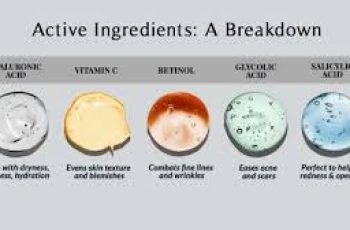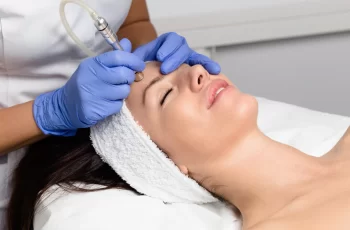Peptides are a bit like PPIs in terms of how they work – people talk about them, but I don’t think many of us really understand them or know what they really offer.
As Freud said, they carry the “stamp of serious science”, but much of the information provided by cosmetic brands about their peptide of choice is hollow: they describe them as “skin firming” or “enhancing”. There’s no real
explanation.
Here’s an introduction to peptides: As you probably know, collagen is a protein. Proteins are made up of amino acids arranged in chains. When collagen breaks down, shorter fragments of amino acids are created.
These small proteins and molecules are called peptides, and they have the ability to actually control your cells, for example making them produce more collagen.
And that’s not all. Consultant dermatologist Dr. Justine Hextall, a representative of the Harley Medical Group, believes that peptides can have many different applications. “They may have the effect of enhancing collagen, but there are other types of peptides that can help with general skin regeneration.
For example, it can reduce pigmentation on sun-damaged skin, improve skin elasticity, and make the skin look smoother and firmer,” she explains. “Some peptides can be used because they
“It can even be used for wound healing because of its regenerative effects,” she adds.
“Copper tripeptide is a great example. It’s used to heal wounds or relieve inflammation, and it can also boost collagen and elastin synthesis and has anti-inflammatory and antioxidant properties. That’s why you get so many
different products.” ”
Would you like more? There are also peptides that improve hydration. “Keratin peptides can repair skin and hair by increasing moisture and elasticity,” explains Dr. Hextal. The upshot? Yes, you can definitely use peptides if you suffer from any of the above issues, and unlike many so-called miracle ingredients, there’s plenty of data to back them up. The best-known is probably Matrixyl, made by peptide OG Dr. Carl Lintner. A 2013 study found that it can double collagen levels in the skin, which is nothing to sneeze at. You can find deals on Matrixyl at different price ranges: I like Paula’s Choice Peptide Booster, which costs £51, but The Ordinary has one too. Of course, that’s not all that peptides can do. Integrative Beauty uses peptides in its Good Morning! Super Serum, which costs £95 and has antibacterial properties, making it perfect for oily, acne-prone skin types, as well as any slightly fungal skin types (sorry I had to say that). I’ve written a lot about my love for the NIOD CAIS (£70), but it’s so good – Copper peptides also have antibacterial properties and can rejuvenate the skin. There’s also No7’s new skincare range, Future Renew, which has been described as ‘Botox in a bottle’.
Every product from the No7 Future Renew Serum (£42.95) to the No7 Future Renew Night Cream (£34.95) relies on ‘gastrobiology’, essentially a combination of two peptides naturally found in the skin, to improve collagen.
Think of peptides as a godsend for skincare. Whatever the problem, there’s probably a peptide that can fix it. You can go for products that plump, brighten, hydrate or all three if you like.
Personally, I love the boosting serums best, as finding one that hits all your skin needs and contains the peptide blend you need can be quite a challenge. But if you’re looking to cut back on your routine, go for it. One of the multi-tasking products.
DQH Can I use salicylic acid first and then vitamin C?
It’s easy to create a skincare routine, but knowing how to use it is another thing entirely. In most cases, if you’re not getting the desired skin results, it could be due to the layering of conflicting ingredients. So, is it possible that salicylic acid and vitamin C are such ingredients? Or are these active ingredients the duo that’s been missing from your skincare routine? If you want answers, stick around because today we are going to explain the benefits of salicylic acid and vitamin C and how they can be used in your daily life.
What are the benefits of salicylic acid for skin?
Salicylic acid is one of the most commonly used beta hydroxy acids and is favored by many people with oily, acne-prone skin. This acid is derived from willow bark, and unlike its water-soluble relatives (called alpha-hydroxy acids), salicylic acid is oil-soluble, which means it can penetrate deeper into the lower layers of the skin. Once it reaches the lower layers, it can help unclog pores of excess sebum, dirt, bacteria, debris, and impurities. This results in clearer skin tones and greater definition.
Not only does salicylic acid benefit the underlying layers, but the outer surface of the skin benefits as well. When applied to the skin, salicylic acid removes the buildup of dead skin cells. This is accomplished by breaking the bonds that hold dead cells to the surface. Over time, this can cause the complexion to look dull and prone to acne, blackheads, and other blemishes.
If you’d like to learn more about salicylic acid and how it can improve your skin, check out this dedicated blog post from a beauty insider.
What are the benefits of vitamin C for skin?
Vitamin C is considered one of the most powerful antioxidants, which means it is very effective at fighting free radicals and preventing them from causing further skin damage. Examples of free radicals include pollution, central heating, UV rays and harsh climate. They attack proteins, fats and cell membranes as soon as they come into contact with the skin, causing signs of premature aging such as fine lines and wrinkles as well as hyperpigmentation, flaky patches of skin and loss of elasticity.
Many people usually prefer to use vitamin C in their morning routine as this ingredient gives the complexion a radiant glow. You’ll also find that vitamin C can target areas of hyperpigmentation, plumping the skin and reducing the appearance of fine lines and wrinkles.
The thing about vitamin C is that there are a lot of outdated studies going back to the 1950s that describe vitamin C as an unstable skin component. Thanks to improvements in modern technology, this is no longer the case as all products now contain a stable form of vitamin C.
Visit The Beauty Insider to learn more about vitamin C. So please check out our blog post.
Can I use salicylic acid first and then vitamin C?
Yes, you absolutely can. In fact, it’s thought that using salicylic acid before using vitamin C ensures it penetrates faster and works faster.
This is an efficient way to utilize two power sources, and the reason has to do with pH. For example, the skin’s natural pH is about 4.7, making it slightly acidic. Salicylic acid and vitamin C are also both acidic, and you’ll find that vitamin C is absorbed quickly into the skin. Therefore, using salicylic acid beforehand can increase the acidity of the skin and allow vitamin C to penetrate into the skin faster.
While this is considered an effective way to combine two powerful ingredients, you need to be aware of your skin type and how it reacts to certain active ingredients. Even people with perfect, normal skin can experience skin sensitivity and irritation. Therefore, always consult a doctor or dermatologist before using any new products on your skin.
It’s also important to follow skin application rules. In this case, you need to use the product correctly to ensure you get the best results for your skin. If you’re not sure what I mean, the basic rule for skin is to start with the thinnest consistency and work your way up to the thickest consistency. This prevents a barrier from forming on the surface, preventing other active ingredients from penetrating the skin.
Can I use salicylic acid at night and vitamin C in the morning?
Yes, absolutely, this is considered the most effective way to get returns without any adverse side effects. This is because there is enough time between applications to ensure that the skin’s pH levels return to balance.
You’ll also find that Vitamin C is rich in antioxidants and is perfect for use in the morning to ensure your skin is protected and looking its healthiest. Due to the small size of salicylic acid molecules, it is an acid that is able to reach the deepest parts of the skin. While this is effective at keeping skin clear, it also increases the risk of irritation and photosensitivity. Therefore, many people prefer to use powerful BHAs in their evening routine without exposure to UV rays, pollution, or harsh weather.
Warning: If you avoid using sunscreen every day, none of these ingredients will do what your skin needs. The combination of chemical peels and powerful ingredients increases the risk of further damage to the skin’s surface. Use SPF 50 every day to keep your skin protected and your lipid barrier healthy, even on cloudy days, keeping your skin in top condition.



